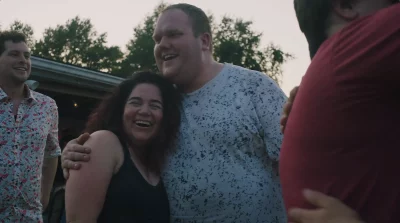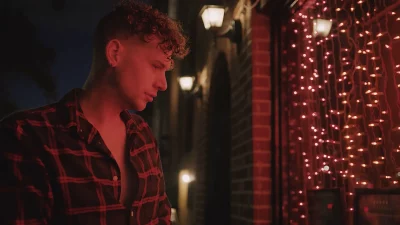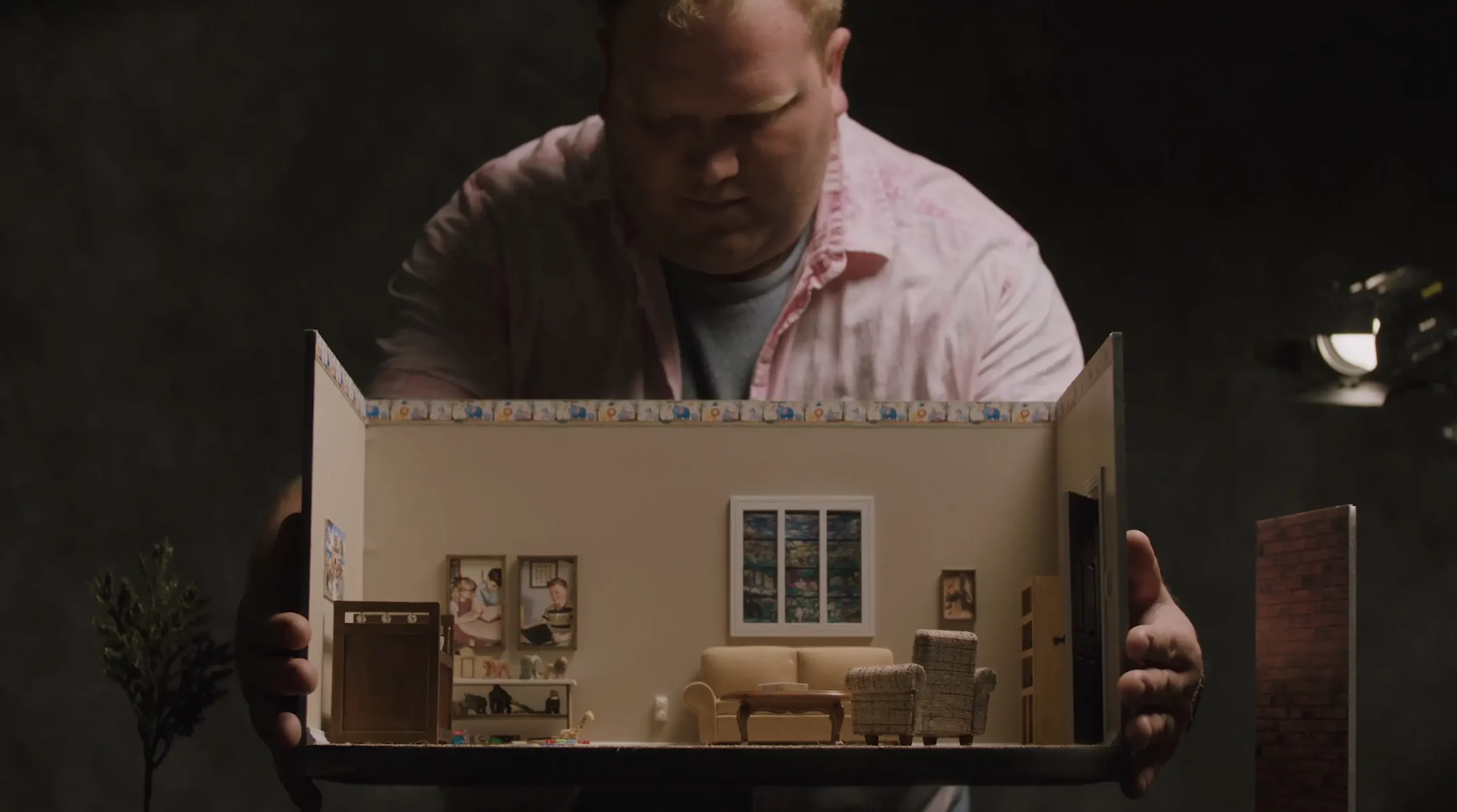Filmmaker Zach Meiners Shares His Story in Conversion
Film
While growing up in Kentucky, Zach Meiners was an outgoing child who loved to perform and be in front of an audience, and seemed destined for a future as an actor. As he moved into his teens, Meiners started shifting his creative ambitions to keep him behind the camera. It wasn’t until making his new documentary, Conversion—which chronicles the stories of three survivors of conversion therapy, including Meniers himself—that he really came to understand this reasons for this change.
 “I loved being on stage and in front of the camera,” Meiners says. “But conversion therapy introduced shame into my life. And it was around that time that I kind of stopped wanting to be in front of the camera, and started wanting to tell people stories.” Meiners studied filmmaking in college, and directed his first feature at the age of 21. In 2016, he came out as a gay man, and wanted to start living his truth. Still, Meiners didn’t know how this would effect his filmmaking ambitions until he was faced with some unsettling news. In a phone call with his mother, Meiners learned that John Paulk, the founder of Love Won Out, the conversion therapy group that Meniers had attended as a teen, was still practicing. “When I learned my conversion therapist was still active, I was shocked,” Meiners explains. Conversion therapy, also known as reparative therapy, aims to alter an individual’s sexual orientation or gender identity. Widely discredited as pseudoscience, this practice has been universally condemned as harmful by leading mental health organizations. Meiners was prompted to tell his story of the intense psychological and emotional damage caused by the therapy, and set out to make a public service announcement to amplify the voices of survivors. The project soon evolved into a feature documentary, in part due to the participation of Dustin Rayburn, better known under by their stage name, Dusty Ray Bottoms, who competed in season 10 of RuPaul’s Drag Race. Meiners first saw the show playing on a television on his trip to a gay bar, and heard Rayburn, who is non-binary, speak about their own experiences with conversion therapy. “I had never heard anyone talk about it publicly,” Meiners says. “This was something I went through, and just even seeing the reaction of other people in the bar being like, ‘Oh my God, how horrible this is.’ It’s something I didn’t even really think of that much, because it was just so normalized in the culture that I grew up in.” Meiners reached out to Rayburn through instagram. “They ended up reluctantly agreeing to a 20 minute interview, and Dusty ended up talking for two hours,” Meiners says.
“I loved being on stage and in front of the camera,” Meiners says. “But conversion therapy introduced shame into my life. And it was around that time that I kind of stopped wanting to be in front of the camera, and started wanting to tell people stories.” Meiners studied filmmaking in college, and directed his first feature at the age of 21. In 2016, he came out as a gay man, and wanted to start living his truth. Still, Meiners didn’t know how this would effect his filmmaking ambitions until he was faced with some unsettling news. In a phone call with his mother, Meiners learned that John Paulk, the founder of Love Won Out, the conversion therapy group that Meniers had attended as a teen, was still practicing. “When I learned my conversion therapist was still active, I was shocked,” Meiners explains. Conversion therapy, also known as reparative therapy, aims to alter an individual’s sexual orientation or gender identity. Widely discredited as pseudoscience, this practice has been universally condemned as harmful by leading mental health organizations. Meiners was prompted to tell his story of the intense psychological and emotional damage caused by the therapy, and set out to make a public service announcement to amplify the voices of survivors. The project soon evolved into a feature documentary, in part due to the participation of Dustin Rayburn, better known under by their stage name, Dusty Ray Bottoms, who competed in season 10 of RuPaul’s Drag Race. Meiners first saw the show playing on a television on his trip to a gay bar, and heard Rayburn, who is non-binary, speak about their own experiences with conversion therapy. “I had never heard anyone talk about it publicly,” Meiners says. “This was something I went through, and just even seeing the reaction of other people in the bar being like, ‘Oh my God, how horrible this is.’ It’s something I didn’t even really think of that much, because it was just so normalized in the culture that I grew up in.” Meiners reached out to Rayburn through instagram. “They ended up reluctantly agreeing to a 20 minute interview, and Dusty ended up talking for two hours,” Meiners says.
The other survivor profiled in Conversion is Elena Joy Thurston, a former member of The Church of Jesus Christ of Latter-Day Saints. “I can’t take credit for finding Elena. Elena found me,” Meiners says. “I was doing some advocacy work in Louisville, and there were some articles written, and they mentioned the film and the project that we were in the process of making it. And Elena reached out to me, and I’ve really been looking for other people to tell their stories.” A former Mormon housewife, Thurston was married at age 20 and had four children by the time she was 30. When her youngest child started school and Thurston found herself with time to focus on herself, thoughts and feelings that she had repressed or ignored suddenly became very prevalent. As a faithful member of the church, she sought a way to battle her “same-sex” attraction and save her marriage, even though she wasn’t happy. “I think so often, especially in conservative environments, queer people are made to feel within certain isolated communities that ‘you are alone’ and that there aren’t other people like you out there,” Meiners says. Thurston is the founder of the Pride and Joy Foundation, an LGBTQ+ advocacy group, and a prominent activist and speaker, having given a TED talk about her experiences in 2019.
in Louisville, and there were some articles written, and they mentioned the film and the project that we were in the process of making it. And Elena reached out to me, and I’ve really been looking for other people to tell their stories.” A former Mormon housewife, Thurston was married at age 20 and had four children by the time she was 30. When her youngest child started school and Thurston found herself with time to focus on herself, thoughts and feelings that she had repressed or ignored suddenly became very prevalent. As a faithful member of the church, she sought a way to battle her “same-sex” attraction and save her marriage, even though she wasn’t happy. “I think so often, especially in conservative environments, queer people are made to feel within certain isolated communities that ‘you are alone’ and that there aren’t other people like you out there,” Meiners says. Thurston is the founder of the Pride and Joy Foundation, an LGBTQ+ advocacy group, and a prominent activist and speaker, having given a TED talk about her experiences in 2019.
The production of Conversion spanned six years, navigating funding challenges and the emotional complexities of survivor testimonies. “It was a labor of love and necessity,” Meiners admits. “Every interview and frame was dedicated to honoring survivor’s voices and exposing the realities of conversion therapy.” As Conversion finds its audience, having premiered on digital platforms including Prime Video, AppleTV and Fandango at home on July 2, Meiners remains committed to its mission, hopeful that the film will educate and empower audiences worldwide. “This film is a testament to survivor resilience,” he declares. “It calls for action against conversion therapy and for support of LGBTQ+ rights.” Studies by The Williams Institute indicate that there are over 698,000 conversion therapy survivors in the United States, and that up to 42% of survivors have attempted or seriously considered suicide over the past year alone.
Meiners remains hopeful that the film will educate and empower audiences worldwide as it gradually reaches an audience and gets its messages across—the most important, perhaps, being the simple words: you are not alone. Zach Meiners now knows that he is far from alone, and his journey from shame to empowerment exemplifies the power of storytelling to inspire empathy, provoke thought and drive action towards justice and equality.
Read more film interviews here:
Luke Gilford and The Cast of National Anthem
Animator Matt Majers’ Emotional Journey Through Inside Out 2

